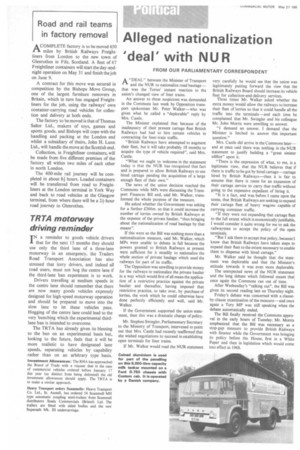Alleged nationalization 'deal' with NUR
Page 82

If you've noticed an error in this article please click here to report it so we can fix it.
FROM OUR PARLIAMENTARY CORRESPONDENT
A"DEAL" between the Minister of Transport and the NUR to nationalize road haulage— that was the Tories' instant reaction to the union's changed view of liner trains.
An answer to these suspicions was demanded in the Commons last week by Opposition transport spokesman Mr. Peter Walker—who was given what he called a "deplorable" reply by Mrs. Castle.
The Minister explained that because of the inadequacy of their present cartage fleet British Railways had had to hire certain vehicles in contracting for liner-train traffic.
"British Railways have attempted to augment their fleet, but it will take probably 18 months to acquire the type of vehicle required", said Mrs. Castle.
"What we ought to welcome in the statement today is that the NUR has recognized that fact and is prepared to allow British Railways to use hired cartage pending the acquisition of a large enough fleet of their own."
The news of the union decision reached the Commons while MPs were discussing the Transport Finances Bill and, said Mr. Walker, transformed the whole purpose of the measure.
He asked whether the Government was asking for a further 066m. so that it could increase the number of lorries owned by British Railways at the expense of the private haulier, "thus bringing about the nationalization of road haulage by that means".
If this were so the Bill was nothing more than a nationalization measure. said Mr. Walker, which MPs were unable to debate in full because the powers granted to British Railways at present were sufficient for it steadily to nationalize the whole section of private haulage which used the railways for part of its traffic.
The Opposition was unwilling to provide money for the railways to nationalize the private haulier in a way which would first of all mean the application of a restrictive practice against the private haulier and thereafter, having imposed that restrictive practice, to take over, by purchase of lorries, the work which he could otherwise have done perfectly efficiently and well, said Mr. Walker.
If the Government supported the union statement, then this was a dramatic change of policy.
Mr. Stephen Swingler, Parliamentary Secretary to the Ministry of Transport, intervened to point Out that Mrs. Castle had recently reaffirmed that she wished negotiations to succeed in establishing open terminals for liner trains.
If Mr. Walker would read the NUR statement very carefully he would see that the union was legitimately putting forward the view that the British Railways Board should increase its vehicle fleet for collection-and-delivery services.
Three times Mr. Walker asked whether the extra money would allow the railways to increase their fleet of lorries so that it could handle all the traffic into the terminals—and each time he complained that Mr. Swingler and his colleague Mr. John Morris were unwilling to answer.
"I demand an answer. I demand that the Minister is fetched to answer this important question."
Mrs. Castle did arrive in the Commons later— and at once said there was nothing in the NUR statement to justify building a "great sinister edifice" upon it.
"There is the expression of what, to me, is a legitimate view, that the NUR believes that if there is traffic to be got by hired cartage—cartage hired by British Railways—then it is fair to assume that there is room for an expansion of their cartage service to carry that traffic without going to the expensive expedient of hiring it.
"It is a fact, and was before I came upon the scene, that British Railways are seeking to expand their cartage fleet of heavy wagons capable of carrying container traffic.
"If they were not expanding that cartage fleet to the full extent which is economically justifiable, I would consider it quite wrong for me to ask the railwaymen to accept the policy of the open terminals.
"But I ask them to accept that policy, because I know that British Railways have taken steps to expand their fleet to the extent necessary to enable them to dispense with hired cartage."
Mr. Walker said he thought that the statement was deplorable and that the Minister's attitude towards it was even more deplorable.
The unexpected news of the NUR statement and the long debate which followed meant that once again the Commons ran out of time.
After Wednesday's "talking out", the Bill was given its second reading late on Thursday night.
Friday's debate was concerned with a clauseby-clause examination of the measure—and once again a Tory MP was still speaking when the debate automatically ended.
The Bill finally received the Commons approval in the early hours of Tuesday. Mr. Morris emphasized that the Bill was necessary as a stop-gap measure to provide British Railways with finance while the Government was bringing its policy before the House, first in a White Paper and then in legislation which would come into effect in 1968.




































































































































































































































































